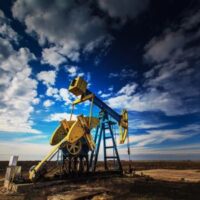Oil Well Maintenance Can Be Dangerous

Many aspects of oilfield work are dangerous for employees. One phase, however, that often gets overlooked is oil well servicing, which encompasses all of the work on a well that takes place after drilling has already finished, but prior to capping, such as inspections, as well as maintenance and repairs. Unfortunately, these tasks can be just as dangerous for workers as those that are required when actively drilling.
What is Well Servicing?
The oil well servicing phase occurs after drilling has stopped and before a well is capped. It involves conducting maintenance and making repairs on the structure and components of the well, which ensure that the oil will continue to flow. One of the most important aspects of well servicing is inspection, which involves running a variety of tests to determine a well’s productivity, such as:
- Daily production tests;
- Oil-to-gas ratio tests;
- Visual exams to look for poor welding or signs of corrosion;
- Radiography tests, which use x-rays to check the integrity of the well’s components;
- Thermography tests, which find leaks in pipes and insulation by measuring temperature differences; and
- Barrel tests, which identify wells that had a decrease in production (if the daily production for more than one well has gone down).
Well servicing also involves well intervention, which requires the making of repairs to improve operation, such as using wireline or coiled tubing to prevent blockages and adjusting pumps and valves. Heavy intervention may be required if a well is sluggish, which in turn, may require the dismantling of the completion components and replacement of worn parts, or more significant changes that will allow the well to adapt to sand and water production. While all of these aspects of servicing are critical to keep oil wells operating efficiently, they can be dangerous for employees.
Oil Well Servicing Risks
The teams that service oil wells face all of the same dangers as other oilfield employees, such as being injured after falling from platforms, being struck by swinging cables and other equipment, and inhaling dangerous gases and vapors. Well servicing teams work long shifts, often many days in a row and in freezing or extremely hot conditions. Problems like hypothermia or sunstroke are common, as are injuries caused by overuse or repetitive motions. Servicing specialists use a wide range of equipment and tools to diagnose problems with oil wells. Unfortunately, equipment and tool malfunction can cause injuries, as can fires and explosions, which are always a risk on an oilfield, where even friction or heat can ignite flammable vapors and gases. The injuries sustained while servicing oil wells are often severe and in many tragic cases, end up being fatal. When this happens, the injured parties or their surviving family members can seek compensation for their medical bills, lost wages, and pain and suffering.
Experienced and Compassionate Tulsa Oilfield Accident Lawyers
Oilfield work is inherently dangerous, putting employees at risk of devastating injury. If you were hurt while working on an oilfield, you may qualify for compensation. Call Levinson Law, P.C. at 918-492-4433 to speak with one of our dedicated Tulsa oilfield accident attorneys about your legal options.
Sources:
osha.gov/etools/oil-and-gas/servicing/general-services
apnews.com/article/17061b5baa5a41a28384f4cdffd56f5a

